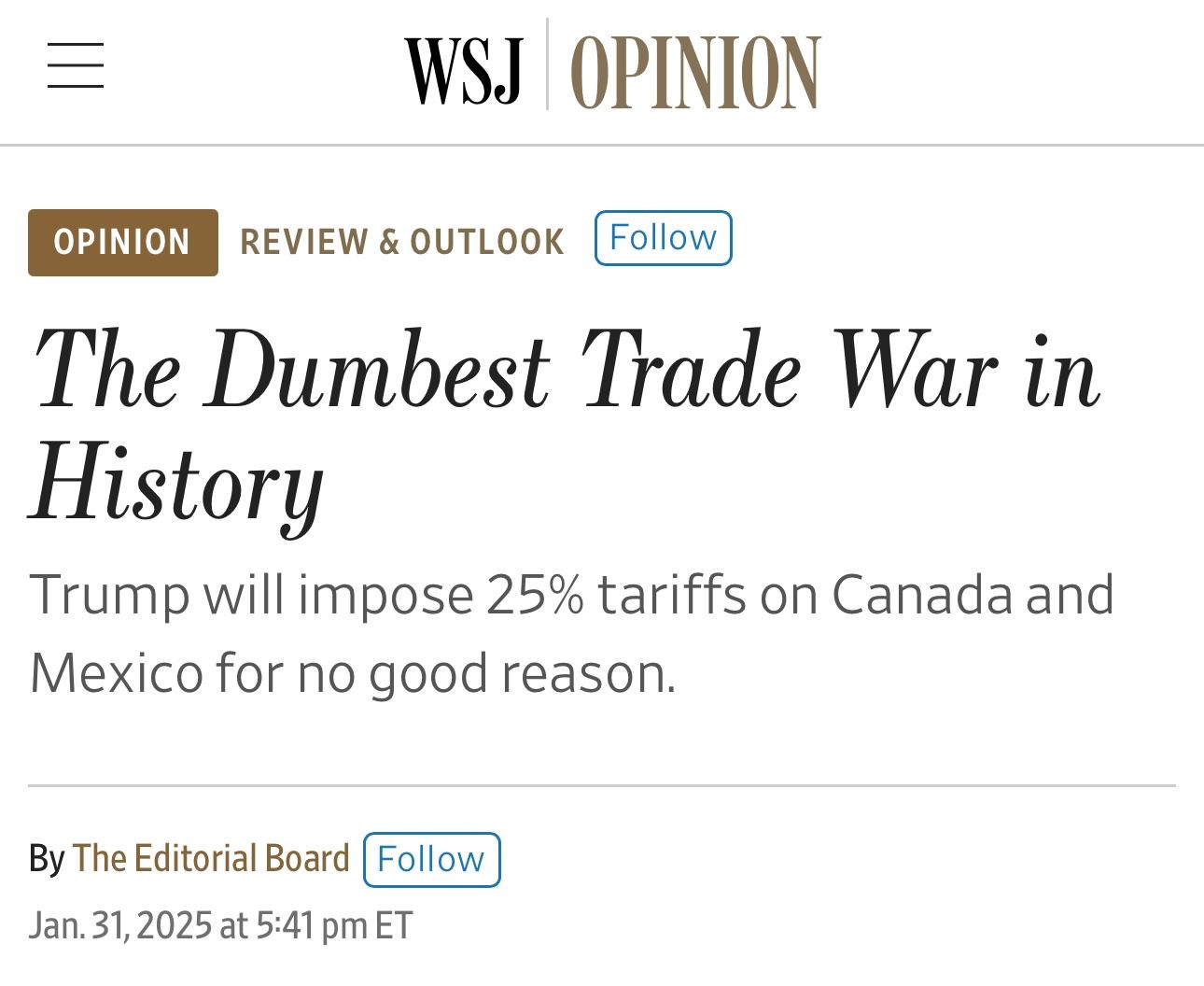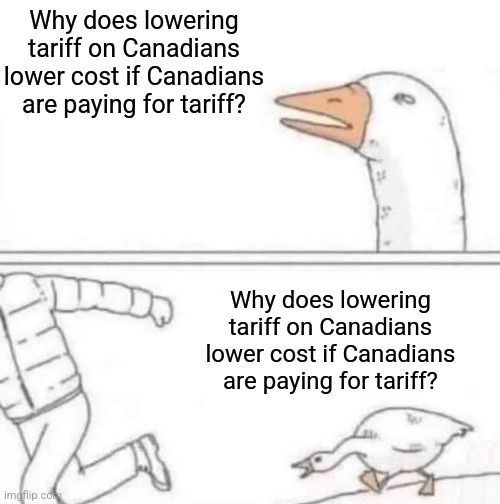Canadian Tariff situation gets its own thread
-
Probably the best speech or national address Trudeau has made in his political career.
Quite a feat, the country is rallying around the Trudeau government on this.
To paraphrase Forrest Gump; And just like that, Canadians came to despise Donald Trump even more than Justin Trudeau.
@Renauda said in Canadian Tariff situation gets its own thread:
Probably the best speech or national address Trudeau has made in his political career.
Quite a feat, the country is rallying around the Trudeau government on this.
To paraphrase Forrest Gump; And just like that, Canadians came to despise Donald Trump even more than Justin Trudeau.
@Renauda I agree. He did his job today. It was good. I’m waiting for what step #2 could be, like export taxes, perhaps ?potash ?uranium, ?aluminum. I’m also wondering, waiting what Mexico will do specifically.
Personally, living in the land of WCS, AECO, blends, glycol, I’m worrying of people’s jobs. These hit fast and hard. People are already suffering.It’s all so stupid, your American president. We’re a continent of trade partners, not enemies. As a POTUS, why piss off your neighbours when you’re really pissed of China, or frustrated of your own country’s failings, like with fentanyl, or decades of Mexico border crossings?
@Horace said in Canadian Tariff situation gets its own thread:
Looks like Canada can do something performative, give Trump a PR win, and the tariffs will be revoked. I hope that is the outcome of this.
You’ve hit something here. Someone here said to me “Oh, he admires Putin.. that’s what he’s doing .. he wants to be a Putin”. That made me think. But yes, to the world, I do think he wants to be seen as a Leader Supreme. It’s his personal goal, perhaps something he’s wanted prior to running for POTUS the first time? With a North American PR win, he gets an ego stroke. By bullying his country’s trade partners and winning somewhat, he feels good. I hope he’s willing to listen to his own economists, trade experts, and back tracks his idea, his tariffs. What he’s doing, even short term, will impact the U.S. too.
-
@Renauda said in Canadian Tariff situation gets its own thread:
Probably the best speech or national address Trudeau has made in his political career.
Quite a feat, the country is rallying around the Trudeau government on this.
To paraphrase Forrest Gump; And just like that, Canadians came to despise Donald Trump even more than Justin Trudeau.
@Renauda I agree. He did his job today. It was good. I’m waiting for what step #2 could be, like export taxes, perhaps ?potash ?uranium, ?aluminum. I’m also wondering, waiting what Mexico will do specifically.
Personally, living in the land of WCS, AECO, blends, glycol, I’m worrying of people’s jobs. These hit fast and hard. People are already suffering.It’s all so stupid, your American president. We’re a continent of trade partners, not enemies. As a POTUS, why piss off your neighbours when you’re really pissed of China, or frustrated of your own country’s failings, like with fentanyl, or decades of Mexico border crossings?
@Horace said in Canadian Tariff situation gets its own thread:
Looks like Canada can do something performative, give Trump a PR win, and the tariffs will be revoked. I hope that is the outcome of this.
You’ve hit something here. Someone here said to me “Oh, he admires Putin.. that’s what he’s doing .. he wants to be a Putin”. That made me think. But yes, to the world, I do think he wants to be seen as a Leader Supreme. It’s his personal goal, perhaps something he’s wanted prior to running for POTUS the first time? With a North American PR win, he gets an ego stroke. By bullying his country’s trade partners and winning somewhat, he feels good. I hope he’s willing to listen to his own economists, trade experts, and back tracks his idea, his tariffs. What he’s doing, even short term, will impact the U.S. too.
-
@blondie said in Canadian Tariff situation gets its own thread:
It’s all so stupid, your American president. We’re a continent of trade partners, not enemies.
WSJ Editorial Board agrees.

@jon-nyc said in Canadian Tariff situation gets its own thread:
@blondie said in Canadian Tariff situation gets its own thread:
It’s all so stupid, your American president. We’re a continent of trade partners, not enemies.
WSJ Editorial Board agrees.

The article:
President Trump will fire his first tariff salvo on Saturday against those notorious American adversaries . . . Mexico and Canada. They’ll get hit with a 25% border tax, while China, a real adversary, will endure 10%. This reminds us of the old Bernard Lewis joke that it’s risky to be America’s enemy but it can be fatal to be its friend.
Leaving China aside, Mr. Trump’s justification for this economic assault on the neighbors makes no sense. White House press secretary Karoline Leavitt says they’ve “enabled illegal drugs to pour into America.” But drugs have flowed into the U.S. for decades, and will continue to do so as long as Americans keep using them. Neither country can stop it.
Drugs may be an excuse since Mr. Trump has made clear he likes tariffs for their own sake. “We don’t need the products that they have,” Mr. Trump said on Thursday. “We have all the oil you need. We have all the trees you need, meaning the lumber.”
Mr. Trump sometimes sounds as if the U.S. shouldn’t import anything at all, that America can be a perfectly closed economy making everything at home. This is called autarky, and it isn’t the world we live in, or one that we should want to live in, as Mr. Trump may soon find out.
Take the U.S. auto industry, which is really a North American industry because supply chains in the three countries are highly integrated. In 2024 Canada supplied almost 13% of U.S. imports of auto parts and Mexico nearly 42%. Industry experts say a vehicle made on the continent goes back and forth across borders a half dozen times or more, as companies source components and add value in the most cost-effective ways.
And everyone benefits. The office of the U.S. Trade Representative says that in 2023 the industry added more than $809 billion to the U.S. economy, or about 11.2% of total U.S. manufacturing output, supporting “9.7 million direct and indirect U.S. jobs.” In 2022 the U.S. exported $75.4 billion in vehicles and parts to Canada and Mexico. That number jumped 14% in 2023 to $86.2 billion, according to the American Automotive Policy Council.
American car makers would be much less competitive without this trade. Regional integration is now an industry-wide manufacturing strategy—also employed in Japan, Korea and Europe—aimed at using a variety of high-skilled and low-cost labor markets to source components, software and assembly.
The result has been that U.S. industrial capacity in autos has grown alongside an increase in imported motor vehicles, engines and parts. From 1995-2019, imports of autos, engines and parts rose 169% while U.S. industrial capacity in autos, engines and parts rose 71%.
As the Cato Institute’s Scott Lincicome puts it, the data show that “as imports go up, U.S. production goes up.” Thousands of good-paying auto jobs in Texas, Ohio, Illinois and Michigan owe their competitiveness to this ecosystem, relying heavily on suppliers in Mexico and Canada.
Tariffs will also cause mayhem in the cross-border trade in farm goods. In fiscal 2024, Mexican food exports made up about 23% of total U.S. agricultural imports while Canada supplied some 20%. Many top U.S. growers have moved to Mexico because limits on legal immigration have made it hard to find workers in the U.S. Mexico now supplies 90% of avocados sold in the U.S. Is Mr. Trump now an avocado nationalist?
Then there’s the prospect of retaliation, which Canada and Mexico have shown they know how to do for maximum political impact. In 2009 the Obama Administration and Congressional Democrats ended a pilot program that allowed Mexican long-haul truckers into the U.S. as stipulated in Nafta. Mexico responded with targeted retaliation on 90 U.S. goods to pressure industries in key Congressional districts.
These included California grapes and wine, Oregon Christmas trees and cherries, jams and jellies from Ohio and North Dakota soy. When Mr. Trump imposed steel and aluminum tariffs in 2018, Mexico got results using the same tactic, putting tariffs on steel, pork products, fresh cheese and bourbon.
Canadian Prime Minister Justin Trudeau has promised to respond to U.S. tariffs on a dollar-for-dollar basis. Canada could suffer a larger GDP hit since its economy is so much smaller, but American consumers will feel the bite of higher costs for some goods.
None of this is supposed to happen under the U.S.-Mexico-Canada trade agreement that Mr. Trump negotiated and signed in his first term. The U.S. willingness to ignore its treaty obligations, even with friends, won’t make other countries eager to do deals. Maybe Mr. Trump will claim victory and pull back if he wins some token concessions. But if a North American trade war persists, it will qualify as one of the dumbest in history.
-
Industry experts say a vehicle made on the continent goes back and forth across borders a half dozen times or more, as companies source components and add value in the most cost-effective ways.
This is why the statement above about assembly lines going dark on both sides of the border probably isn’t hyperbole. If you add 25% tax on each of those part movements the car likely becomes uneconomic to build at all.
-
-
@Jolly said in Canadian Tariff situation gets its own thread:
This may be the reason?
Danielle Smith? You have got to be kidding. She probably sold the country out when she went to Mar-I-Lago. The woman is not only an idiot but a menace.
Of course look at the source, Rebel News. Lorne Gunter and Ezra Levant. Not to mention the resident water boy and gossip for the Trump camp.
-
Yeah. Rebel News. I don’t believe even Maxine Bernier* considers it a serious news source.
*Leader of the decidedly right wing conservative/libertarian party in Canada. The People’s Party of Canada.
A tenfold more accurate assessment of Danielle Smith in this battle is here:
-
I think this does answer the question about whether Trump believes his own shit about tariffs.
As Scott Lincicome from Cato Institute says, if Canadian producers will pay the tariffs, why reduce the ones on energy to 10%?
@jon-nyc said in Canadian Tariff situation gets its own thread:
I think this does answer the question about whether Trump believes his own shit about tariffs.
As Scott Lincicome from Cato Institute says, if Canadian producers will pay the tariffs, why reduce the ones on energy to 10%?

-
@jon-nyc said in Canadian Tariff situation gets its own thread:
I think this does answer the question about whether Trump believes his own shit about tariffs.
As Scott Lincicome from Cato Institute says, if Canadian producers will pay the tariffs, why reduce the ones on energy to 10%?

As Scott Lincicome from Cato Institute says, if Canadian producers will pay the tariffs, why reduce the ones on energy to 10%?
One reason could be the fact that 69% of Canadian oil and gas energy stocks are held by Americans.
Am sure there are others
In the meantime here is an 11 minute BBC interview with Mark Carney, former Governor of the Bank of England and Bank of Canada and likely successor to Trudeau next month. This man is no fool and is not afraid to take on the WH bully:
Link to video -
-
Probably the best speech or national address Trudeau has made in his political career.
Quite a feat, the country is rallying around the Trudeau government on this.
To paraphrase Forrest Gump; And just like that, Canadians came to despise Donald Trump even more than Justin Trudeau.
@Renauda said in Canadian Tariff situation gets its own thread:
Quite a feat, the country is rallying around the Trudeau government on this.
Is there anything Trump can't do?
-
This will be interesting.
Complete destruction of trust for long term economic cooperation.
Trump saw it work with China, with the decoupling after tariffs and Covid supply chain issues.
Interesting that he’s using the same playbook on his “allies”
-
@jon-nyc said in Canadian Tariff situation gets its own thread:
If you’re Canada do you have any choice but to invest in more pipelines to Pacific ports?
I remember when Trump threatened Amazon with increased postal costs. At the time, over 80% of the deliveries in our area were via USPS. Now, 100% of them are by Amazon.
